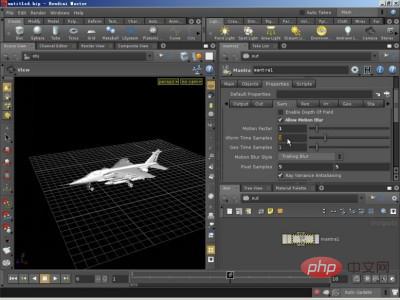
Houdini is a three-dimensional computer graphics software that is an effective tool for creating advanced visual effects. Because it has capabilities across the company's entire product line, Houdini Master is for animators who want to make computer animations more exciting. They provide unprecedented capabilities and productivity. Houdini's own renderer is Mantra, which is based on the Reyes rendering architecture, so it can also quickly render motion blur, depth of field, and displacement effects.

The operating environment of this tutorial: Windows 7 system, Dell G3 computer.
Houdini (three-dimensional computer graphics software)
Houdini (movie special effects magician) Side Effects Software's flagship product is used to create advanced visual effects An effective tool for effects, with capabilities across the company's entire product line, Houdini Master provides animators who want to make their computer animations more exciting with unprecedented power and productivity.
Houdini is a three-dimensional computer graphics software developed by the Canadian company Side Effects Software Inc. (SESI), which was founded in 1987 by Kim Davidson and Greg Hermanovic. Houdini is redeveloped on the basis of Prisms and can run on Linux, Windows, Mac OS and other operating systems. It is a product designed entirely based on node mode. Its structure and operation methods are very different from other 3D software. Houdini's own renderer is Mantra, which is based on the Reyes rendering architecture, so it can also quickly render motion blur, depth of field, and displacement effects. Mantra is a mature, product-proven renderer that can meet film-level rendering requirements. Of course, Houdini also has interfaces for third-party renderers, such as RenderMan, Mental ray, Vray, Arnold, and Torque, etc., which can export scenes to these rendering engines for rendering.

The file extension of the commercial version of Houdini is hip, and the file extension saved in the non-commercial version is hipnc. You can open the commercial version of the file, but the extension will become hipnc. If users of the non-commercial version switch to the commercial version after using it for a period of time, SESI will provide a one-time service of converting all non-commercial version files into commercial version files. Users of the non-commercial version can register for the official forum if they encounter problems during use. Other enthusiastic forum users can help you solve the problem. After registration, you can also download a minor update version from the official website. The minor update version is where the developer fixes the defects of the software. Versions released on the official website. These minor updated versions have a detailed update list on the Houdini Journals page.
Features of Houdini
In general 3D software, many tools are mostly encapsulated into a preset object to reduce the user’s learning cost. . Similar to some C4d generators and deformers, Houdini also has some packaging tools, but more importantly, we can read some data from its underlying software to control the transmission and calculation of these data to achieve the effects we want. Therefore, in a larger operating space, learning will undoubtedly increase costs.
As a node-operated software, you need to have good logical thinking to build the required framework. The biggest surprise about node style is its non-destructive nature. After production is completed, you can return to the node you want to modify at any time and modify the location you want to modify.
The most important thing is that we need to know that Houdini covers almost many areas of 3D production.
Modeling: Using non-destructive modeling and volumetric modeling, I personally will like this modeling method very much. There is no need to consider issues such as wiring. It is also very convenient to modify the parameters of the previous operation midway.
Animation: Fluid animation, character animation, Frozen, and dynamic animation of Disney series such as Zootopia are all produced by Houdini. Many special effects companies are now starting to use the entire Houdini pipeline to create special effects.
Simulation: Powerful simulation computing capabilities such as smoke, particles, cloth, and hair simulation allow animations in several different fields to be combined to produce realistic film and television-level effects.
Rendering: native and powerful film-grade rendering engine Mantra, plus some external renderers (Arnold, etc.). Of course, you can also use high-speed cloud rendering. The cloud rendering platform itself supports Houdini rendering.
The difference between Houdini and Maya
1. Which one is easier to use/learn?
Maya is easier and faster to learn than Houdini. Using Maya, you can create and animate your own 3D scenes and render them as still images or animated sequences. However, its workflow is traditional and it stores changes in user history, making it difficult to go back to a previous version of your work.
Houdini, on the other hand, is difficult because it requires technical knowledge as well as a background in programming and mathematics. However, when you make the most of it, it becomes very convenient. Houdini's unique node-based procedural workflow makes it easy to explore iterations as you optimize your work, and allows for multiple iterations so you can easily make changes and improve animations and effects. It allows you to generate a system that uses the characteristics of a process control model. It can also be used for simulation and allows flexible production.
2. Compatibility with rendering engines
In terms of rendering, both have built-in rendering engines and also support third-party renderers that use GPU capabilities (such as Redshift, Octane, V-Ray, etc.).
For Maya, it comes with Arnold, a powerful and reliable rendering engine. Arnold has proven its power in many feature films and productions, and can always compete with other external renderers. Additionally, starting with version 5.3, Arnold developed GPU rendering options to take advantage of GPU capabilities.
Use Houdini, its famous and powerful rendering engine is Mantra. However, due to rendering speed, external rendering engines such as Redshift, Octane or V-Ray are still the best options.
3. Modeling and Simulation
For polygonal modeling, people tend to choose Maya because it can produce better results in less time. Autodesk has improved Maya's modeling tools to be equivalent to those of Blender or 3ds Max. For example, previously, Maya's UV unwrapping was so bad that artists sometimes needed to use Blender. But now, Maya has better UV unwrapping tools than before. In addition, Maya's NURBS modeling works very well and is very useful for organic modeling and high-precision surfaces.
Maya also has an excellent rigging tool, which includes some nice built-in rigging that can be quickly applied to your model.
While modeling and rigging are not Houdini’s strong suit, its simulation and visual effects are much better. Most of the simulations you need to use are included in the core of Houdini functionality, saving time and money compared to Maya. Houdini excels at handling complex simulations that must handle large amounts of data such as fire, smoke, water, explosions, etc.
Typically, industry studios typically use tools like Maya to handle modeling. Houdini will be used to incorporate complex simulation effects into existing movie scenes and animations.
For more related knowledge, please visit the FAQ column!
The above is the detailed content of What software is Houdini?. For more information, please follow other related articles on the PHP Chinese website!